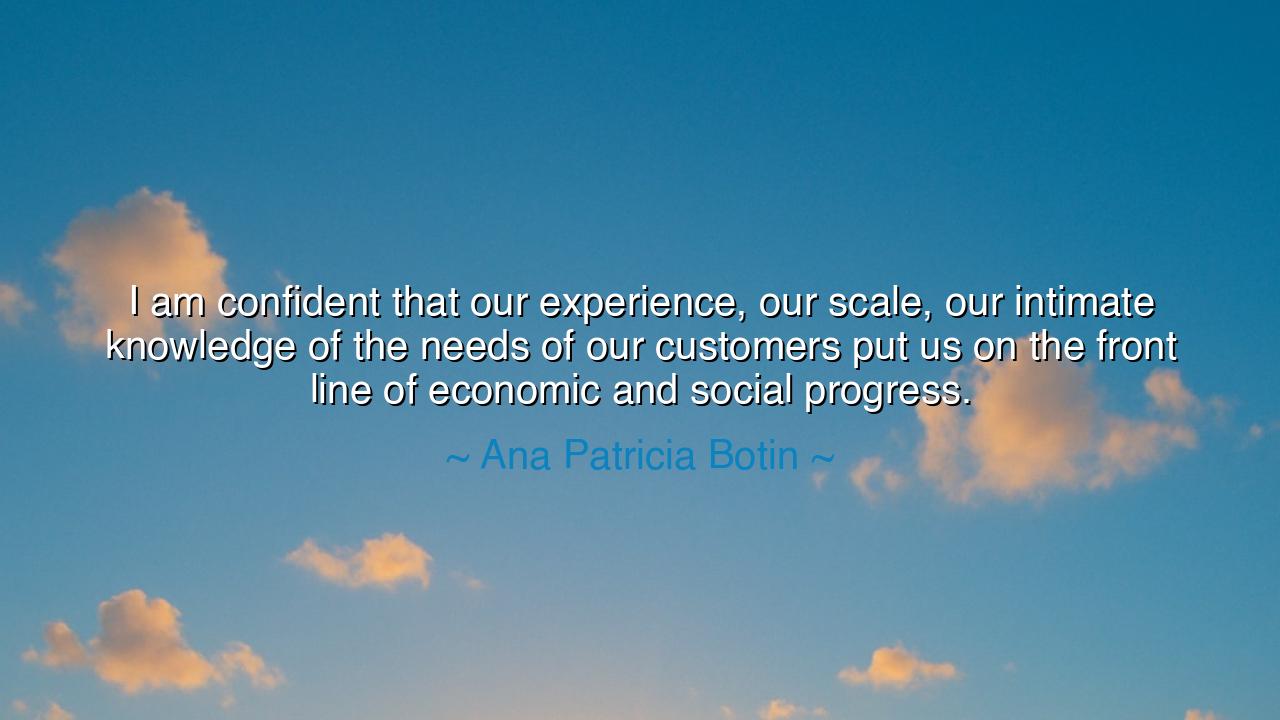
I am confident that our experience, our scale, our intimate
I am confident that our experience, our scale, our intimate knowledge of the needs of our customers put us on the front line of economic and social progress.






The words of Ana Patricia Botín, one of the most influential voices in global finance, carry the calm strength of a leader who understands that true progress is not built by power alone, but by trust, knowledge, and service: “I am confident that our experience, our scale, our intimate knowledge of the needs of our customers put us on the front line of economic and social progress.” In this declaration, Botín—Executive Chair of Banco Santander—speaks not merely of a bank or a business, but of a philosophy: that institutions, when guided by wisdom and purpose, can become engines of transformation. Her words remind us that the economy, at its highest calling, exists not to dominate life, but to serve life—to uplift the many through the vision and responsibility of the few.
To understand the spirit of this quote, we must first know the woman who spoke it. Ana Patricia Botín, born into a lineage of bankers, rose to lead one of the largest financial institutions in the world. Yet her leadership was not driven by inheritance, but by conviction—the belief that finance must be reimagined as a force for good. In a world too often divided between profit and principle, she sought to unite them, declaring that economic strength and social responsibility are not opposites but allies. Her words arose in the aftermath of global crises that shook public faith in the financial world, when people questioned whether banks could be moral actors. To this, she answered not with defense, but with vision: progress, she said, depends on those who know their people and serve them with understanding and integrity.
The heart of her statement lies in three powerful ideas: experience, scale, and knowledge of human need. Experience is the wisdom gained from struggle—the capacity to act with foresight because one has already weathered storms. Scale is the strength of reach—the ability to touch millions of lives and mobilize resources on a grand stage. And knowledge of the customer is the soul of it all—the recognition that behind every number, every transaction, is a person with dreams, fears, and hopes. Botín’s wisdom is that progress is born at the meeting point of these three virtues: where power meets purpose, and where the tools of commerce are wielded for the good of humanity.
In her vision, economic progress is inseparable from social progress. A thriving economy that does not improve lives is an illusion, just as charity without structure fades into sentiment. Botín reminds us that prosperity must be shared, and that those who hold influence must use it to widen the circle of opportunity. When she speaks of being “on the front line,” she speaks not of conquest, but of service—of standing where the needs of the people are greatest and bringing to them the fruits of modern enterprise. This is the same spirit that drove the great reformers of industry—people like Robert Owen, who built communities for his workers, or Muhammad Yunus, who founded microfinance to empower the poor. Each understood, as Botín does, that the true purpose of business is not accumulation, but empowerment.
There is a profound echo of ancient wisdom in her words. In the days of Rome, the philosopher Cicero wrote that the duty of leadership was “not for one’s own advantage, but for the good of the whole.” So too, Botín’s philosophy calls for a new kind of leadership, one that blends the wisdom of the philosopher with the skill of the steward. For in every age, progress depends on those who can balance vision with empathy, power with humility, ambition with service. To lead a great institution is not to rule from above, but to stand among the people, to know their daily trials, and to weave their hopes into the fabric of progress.
Her statement also carries a challenge to us all. Whether we lead a company, a classroom, a family, or a community, we must cultivate the same triad she describes: experience that deepens wisdom, influence that serves others, and an understanding of human need that shapes every decision. In our time, when trust in institutions wanes and inequality grows, her words ring like a call to conscience: the measure of our success is not how much we control, but how deeply we connect. To know people’s needs intimately is to honor their humanity, and to act upon that knowledge is to advance the world.
Let this be the lesson we draw from Ana Patricia Botín’s vision: that true progress is relational. It begins not in governments or boardrooms, but in the recognition that every life is bound to another. Experience without compassion becomes rigidity; scale without purpose becomes tyranny; knowledge without empathy becomes arrogance. But when all three are joined by the golden thread of service, they create a force capable of transforming nations. Each of us, in our own sphere, can live by this wisdom—by seeking to understand before acting, by building where others divide, and by using our strength not for self, but for the common good.
Thus, Botín’s words stand not only as a statement of leadership, but as a creed for the modern age. To stand on the front line of progress is to accept responsibility for the well-being of others. It is to see the world not as a marketplace, but as a shared destiny. And if we, like her, can combine knowledge with compassion, experience with humility, and strength with service, then we, too, will stand at the front line—not as conquerors, but as builders of a more just and human world.






AAdministratorAdministrator
Welcome, honored guests. Please leave a comment, we will respond soon